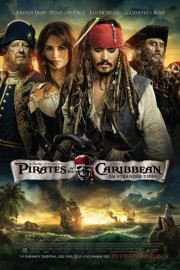Pirates of the Caribbean: On Stranger Tides
Well, that sort of made up for the last two sequels. But I’ll get back to that.
When Disney first announced they were continuing the voyages of Captain Jack Sparrow after the remarkable success of 2003’s “The Curse of the Black Pearl,” I was more than a little hesitant. For me, that film was a near-perfect piece of modern escapism that didn’t need to be sullied by sequels, even if the final image of Johnny Depp’s Sparrow setting sea cried out for more. But modern Hollywood has yet to find a superb, original film it couldn’t suck dry for further profit (see one-shot films turned blockbuster franchises such as “Die Hard,” “Lethal Weapon,” “Back to the Future,” “Beverly Hills Cop,” “The Matrix,” and later, “National Treasure”). Over a billion dollars and two bloated sequels later, “Pirates of the Caribbean” seemed like another franchise that didn’t need to be– how could a fourth film possibly be a good idea in any way other than financially? Watching “On Stranger Tides,” I’m still not certain that question was properly answered, and yet I didn’t feel like my time was wasted, either. Dare I say it, I have found myself contemplating that maybe some more “Pirates” movies wouldn’t be a terrible idea.
This time out, screenwriters Ted Elliott and Terry Rossio use the final moment of 2007’s “At World’s End” as a setup for Sparrow’s quest for the Fountain of Youth in this film. The story this time out is suggested by an outside source– Tim Powers’s novel, On Stranger Tides –but it feels like any other “Pirates” film: more silly Jack Sparrow antics (like impersonating a British judge to get his buddy Gibbs out of jail); more insane action sequences (like the chase through London that follows Sparrow’s opening ruse); more supernatural elements working against Jack (like a zombie-fied crew on Blackbeard’s ship and vicious mermaids that hold a key to unlocking the Fountain’s power); and more flirting, sexual tension, and slapping, between Jack and the ladies, particularly an old flame who claims to be Blackbeard’s daughter (Angelica, played by Penelope Cruz).
The film is different from its predecessors in one significant way, however. Rather than being directed by Gore Verbinski (who has moved on to greener pasturess creatively, as was evident by this year’s “Rango”), “On Stranger Tides” has Rob Marshall at the helm. And how does the director of “Chicago,” “Memoirs of a Geisha,” and “Nine” fare? He knows he’s got a good thing going with the story, and he gets good performances out of everyone involved, but as an action director he has no sense of pacing and energy when it comes to creating fluid action sequences and dramatic tension. And for a film made in Hawaii, an awful lot of the sequences look too much like sound stage shoots– how does that happen with the same gifted cinematographer, Dariusz Wolski, who shot the first three films? I suppose part of the problem could have been from shooting the film in 3D with its problem of diminished light levels, but the process isn’t worthless– Marshall and Wolski use 3D for immersion and visual depth rather than simply a mere gimmick and an excuse for Disney to jack up the prices.
But as I said, Marshall has terrific material to work with narratively and great actors at his disposal. The story isn’t entirely air-tight (I mean, seriously, how did known pirate Barbossa, played by Geoffrey Rush, get in good with the British government?), but it’s an entertaining journey in the best “Pirates” and swashbuckler tradition. And Marshall is successful with his actors, whether it’s Rush, who continues to have a high time as Barbossa, or Cruz, who delivers another wild and sexy performance for Marshall after her Oscar-nominated performance in “Nine,” or Ian McShane as the villainous Blackbeard, “the pirate all pirates fear,” which fits McShane’s performance perfectly. That said, like every other film in this franchise, it all comes down to Depp’s Sparrow. Admittedly, Depp has entered a phase of his career in which self-parody is just as likely from his work as it is from his original brilliance (see his Mad Hatter from “Alice in Wonderland” for the former, and his Sweeney Todd for the latter). Here, Depp seems less interested in creating anything new in the Captain Jack persona and more interested in going through the motions for a big payday, but that doesn’t make the character any less enjoyable to watch for those of us who have sailed with this franchise even when the waters were rough. Why else would I be open to maybe seeing more of Captain Jack in the years to come?










